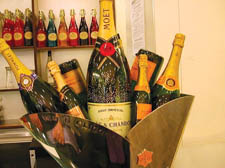|
|
 |
| |

Could these familiar brands be replaced by cheaper, New World varieties? |
Taking the fizz out of Champagne Charlie
After centuries on the top shelf, is the bubble about to burst for the world’s top tipple?
YOUNGER wine drinkers may favour New World red and white wines and ignore the European winemaker.
Conversely their bubbly has to be made in France or, more accurately, its most northern wine making area: Champagne.
A quick look along the supermarket shelves reveals the extent of Champagne’s dominance.
In the upper price brackets Champagne bottles stand alone: only the English Nyetimber Classic Cuvee Brut (England 75cl £23.99, Waitrose), is able to attract a price tag above £20.
Champagne, once portrayed as the drink of the elite, has been England’s favourite upmarket tipple since the 1800s. When upstart music hall act George Leybourne wrote a song about drink, he found himself involved in a feud with an established star, the Great Vance, whose speciality was drinking songs.
The feud caught the public imagination and they played to packed audiences in London’s many Victorian music halls. Each man tried to trump the other with the ultimate drink-inspired song.
When Leybourne produced Champagne Charlie, the Great Vance had no answer. Champagne producers Moët were so grateful for the free advertising they awarded Leybourne a retainer and a continuous supply of free Champagne. He died aged 42 from lifestyle-related diseases.
The French, followed by the British, drink the most Champagne. Although portrayed as a rich man’s drink, post-war Champagne drinkers here and in France have tended to be middle or working-class. Champagne is just as likely to lubricate revelries at the Trades Union Congress in Great Russell Street than oil the boardroom triumphs of a blue chip company.
Lately, unsophisticated young City types with bonuses to burn have taken to drinking huge quantities of the most expensive brands.
Until the 19th century, Champagne production was a cottage industry. Then the widow Clicquot’s cellar master invented the methods which made production on an industrial scale possible.
Subsequently the Germans arrived, Herr’s Bollinger and Krug among them. They set up house in the town of Reims and its surroundings and put Champagne on the road to tremendous commercial success. Since then, Champagne has survived two world wars (it was on the front line in the first one), pestilence, civil disorder and the rise of the New World winemaker.
Change of ownership has not dented this success. The German entrepreneurs and French wholesalers who once dominated the industry have lost control of the great Champagne houses to transnational corporations. The LVMH group controls the Legendary Veuve Clicquot and Krug labels, along with supermarket favourite Moët & Chandon and Ruinart. They produce one in four bottles sold. So far, this has not impacted on sales in the UK and elsewhere; they continue to grow year after year.
But this may be about to change. The transnational companies who control the great Champagne houses are using the skill and experience they have acquired to create Champagne-style sparkling wines across the wine-making world.
Champagne Deutz, founded in 1838 by Prussian immigrants William Deutz and Pierre-Hubert Geldermann, is now owned by drinks giant Pernod-Ricard.
In a partnership with New Zealand winery Montana, also owned by Pernod-Ricard, they have produced a range of Champagne-style sparkling wines in New Zealand, including Deutz, Marlborough cuvée, brut, nv – 75cl (£11.39, Oddbins). Other big Champagne houses are engaged in similar activities.
After centuries of sparkling success is the Champagne bubble about to burst? |
 |
|
| |

|
|
 |
|









